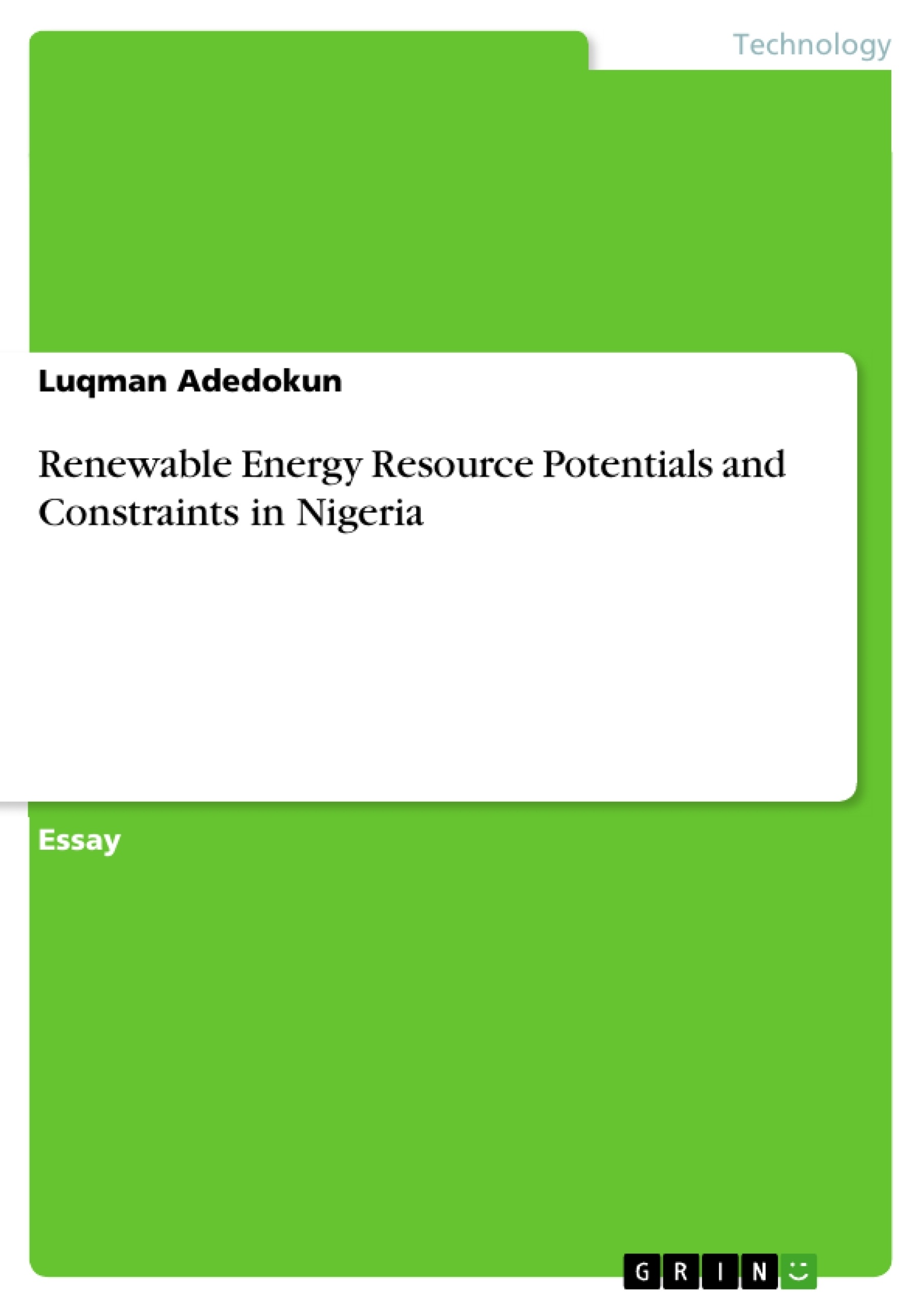This paper discusses the Renewable Energy Resources in Nigeria, its sources, features, potentials and constraints.
The use of fossil fuel in our daily activities has adverse effects on our society. As a result, the need to make a shift to other sources of Energy is paramount. Climate Change in the world we live in is no longer news, hence the need to seek alternative sources of energy to ensure that the earth remains habitable for mankind.
The Nigerian environment affords the exploitation of various renewable source of energy, ranging from solar energy, wind, tidal, just to mention a few. Nigeria has the opportunity to harness its energy resources in a clean and environmentally friendly manner.
Inhaltsverzeichnis (Table of Contents)
- Introduction
- Definition of Renewable Energy
- Renewable Energy Sources in Nigeria
- Solar Energy
- Wind Energy
- Hydro Energy
- Features of Renewable Energy
- Renewable Energy Prospects in Nigeria
- Constraints of Renewable Energy in Nigeria
- Nigeria's Current Situation on Renewable Energy
- Recommendations
- Conclusion
Zielsetzung und Themenschwerpunkte (Objectives and Key Themes)
This paper aims to provide a comprehensive appraisal of renewable energy resources in Nigeria, highlighting their potential and the constraints that hinder their wider adoption. The study explores the various renewable energy sources available in the country, emphasizing their unique features, and assesses their prospects for sustainable development.
- Renewable energy sources in Nigeria, including solar, wind, and hydro energy.
- The features of renewable energy, focusing on their environmental benefits and sustainability.
- The challenges and constraints associated with the development and implementation of renewable energy technologies in Nigeria.
- The current state of renewable energy utilization in Nigeria, exploring both successes and limitations.
- Recommendations for fostering the growth and integration of renewable energy resources in Nigeria's energy mix.
Zusammenfassung der Kapitel (Chapter Summaries)
- Introduction: This chapter defines renewable energy and emphasizes its importance in addressing climate change and transitioning away from fossil fuel dependence. It explores the definition of renewable energy, highlighting its distinction from non-renewable sources.
- Renewable Energy Sources in Nigeria: This chapter delves into the diverse renewable energy resources available in Nigeria, including solar, wind, and hydro energy. It examines the potential of each source, providing specific data on their availability and feasibility for harnessing.
- Features of Renewable Energy: This section explores the distinct characteristics of renewable energy sources, emphasizing their environmental benefits and their potential for promoting sustainable development. It highlights the key features that make renewable energy sources attractive alternatives to traditional energy options.
Schlüsselwörter (Keywords)
This paper focuses on the key terms and concepts related to renewable energy resources in Nigeria, including solar energy, wind energy, hydro energy, sustainable development, environmental benefits, constraints, and policy recommendations. The study emphasizes the potential of renewable energy sources to address the challenges of climate change and energy security in Nigeria.
Frequently Asked Questions
What are the primary renewable energy sources in Nigeria?
Nigeria has significant potential for solar energy, wind energy, and hydro energy due to its environment.
Why is there a need to shift away from fossil fuels in Nigeria?
Fossil fuels have adverse effects on society and contribute to climate change, making alternative clean energy sources paramount for a habitable earth.
What are the main constraints to renewable energy development in Nigeria?
The paper identifies various technical, economic, and policy-related constraints that hinder the wider adoption of renewable technologies.
What is the current situation of renewable energy in Nigeria?
The country is exploring its options but faces challenges in implementation, requiring recommendations for better integration into the energy mix.
What are the environmental benefits of these energy sources?
Renewable energy sources are clean and environmentally friendly, helping to reduce the carbon footprint and ensure sustainable development.
- Quote paper
- Luqman Adedokun (Author), 2016, Renewable Energy Resource Potentials and Constraints in Nigeria, Munich, GRIN Verlag, https://www.grin.com/document/356941



